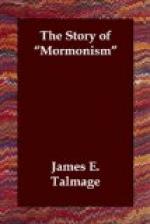It was midday and the festivities were at their height, when a party of men rode into camp and sought an interview with Governor Young. Three of them had plainly ridden hard and far; they gave their report;—an armed force of thousands was at that hour approaching the territory; the boasts of officers and men as to what they would do when they found themselves in “Mormon” towns were reported; and these stories called up, in the minds of those who heard, the dread scenes of Far West and Nauvoo. Had these colonists of the wilderness not gone far enough to satisfy the hatred of their fellow-citizens in this republic of liberty? They had halted between the civilization of the east and that of the west, they had fled from the country that refused them a home, and now the nation would eject them from their desert lodgings.
A council was called and the situation was freely discussed. Had they not seen, lo, these many times, organized battalions and companies surpassing fiendish mobs in villainy? The evidence warranted their conclusion that invasion meant massacre. With tense calmness the plan of action was decided upon. It was the general conviction that war was inevitable, and it was decided to resist to the last. Then, if the army forced its way into the valleys of Utah on hostile purpose bent, it should find the land as truly a desert as it was when the pioneers first took possession. To this effect was the decision:—We have built cities in the east for our foes to occupy; our very temples have been desecrated and destroyed by them; but, with the help of Israel’s God, we will prevent them enriching themselves with the spoils of our labors in these mountain retreats.
There seemed to be no room for doubt that war was about to break upon them; and with such a prospect, men may be expected to take every advantage of their situation. Brigham Young was still governor of Utah, and the militia was subject to his order. Promptly he proclaimed the territory under martial law, and forbade any armed body to cross its boundaries. Echo Canyon, the one promising route of ingress, was fortified. In those defiles an army might easily be stopped by a few; ammunition stations were established; provisions were cached; boulders were collected upon the cliffs beneath which the invaders must pass if they held to their purpose of forcing an entrance. The people had been roused to desperation, and force was to be met with force. In the settlements, combustibles were placed in readiness, and if the worst came, every “Mormon” house would be reduced to ashes, every tree would be hewn down.




